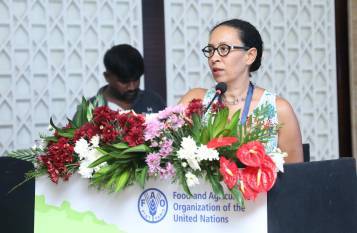CHENNAI, 18 October 2023: A global consortium of marine biologists has warned that climate change is devastating marine life, threatening Asian countries the most.
According to them, by 2100 the highest proportion of fish species—86%— within the Exclusive Economic Zone (EEZ) of the Asian nations is likely to be at high or critical climate risk, compared to 77% in North America, 73% in Oceania and 71% in Africa. By this period, ‘the greatest proportion of high or critical risk species is likely to be in the Indian high seas with 56% followed by 42% in the North Pacific oceans’, they said.
This was the major highlight of a special workshop attended by fishery experts from Regional Fisheries Bodies (RFBs) in the Indo-Pacific region, held at the ongoing international conclave on mainstreaming climate change into international fisheries governance in Mahabalipuram near here.
The three-day conclave is being organised under the leadership of the Food and Agriculture Organisation of the United Nations (FAO), in collaboration with the Department of Fisheries, Government of India, and the Bay of Bengal Programme Inter-Governmental Organisation (BOBP-IGO).
Presenting her views at the workshop, Tarub Bahri, a climate expert and fishery resources officer at the Fisheries and Aquaculture Division of the FAO said that warming of ocean had an adverse impact on productivity and “in average, the maximum catch potential is projected to decrease by up to 12% by 2050, but with large geographical variations”.
Biomass to be decreased
“Projections based on climate scenarios indicate that the global biomass of marine animals is likely to decrease by up to 21%. Tropical regions are expected to experience a greater decrease compared to the global average”, she added.
Leading experts representing various Regional Fisheries Bodies in the Indo-Pacific region presented the current state of the climate change knowledge base, highlighting good practices, gaps and challenges.
Species distribution model
Dr Dan Crear representing Inter-American Tropical Tuna Commission suggested that preparing for climate change requires building species distribution models, processing large environmental databases, understanding the relationship between environmental variables and species and conducting participatory approaches with all stakeholders in the sector. “As ocean conditions change, so will species distributions”, he added.
Forecast models
Dr Isara Chanrachkij of the South East Asian Fisheries Development Centre proposed developing stock assessment and forecast models as a tool towards biodiversity conservation and to mitigate impacts of climate change to fisheries. Enhanced ecosystem services provided by seaweed farming and integrated multi-trophic aquaculture system are crucial to reduce climate risks, he added.
Behavioural Change
A scoping workshop on LiFE (lifestyle for environment) held on the sideline of the conclave called for a behavioural change in lifestyle and individual perception to tackle the looming threat of climate change. As many as 25 LiFE ideas selected from a nationwide contest among students exhibited at the meet.
A parallel workshop exclusively to discuss India's preparedness for adapting to climate change in marine fisheries is also being hosted in the conclave.
Photo caption: Tarub Bahri, a climate expert and fishery resources officer at FAO presenting paper at the workshop.




















